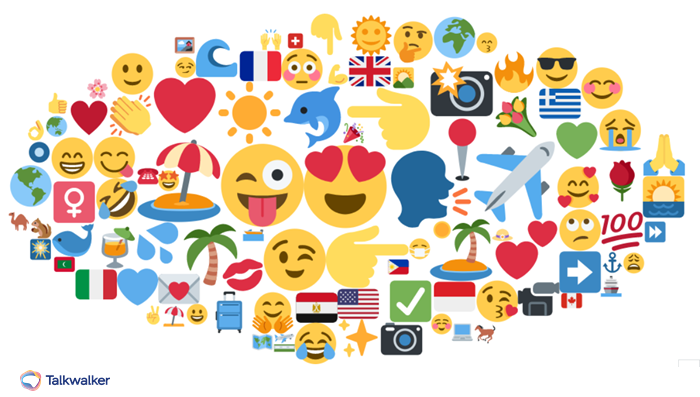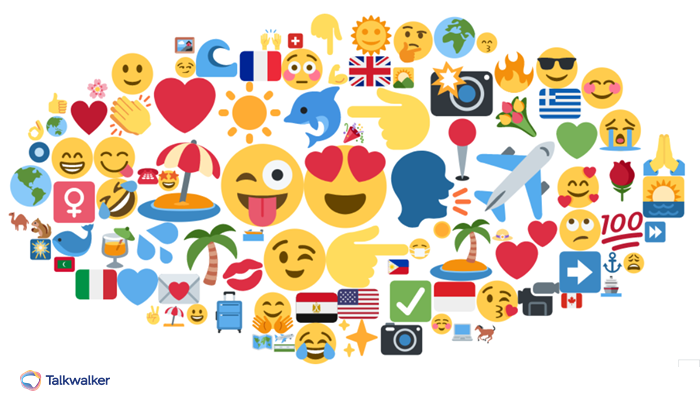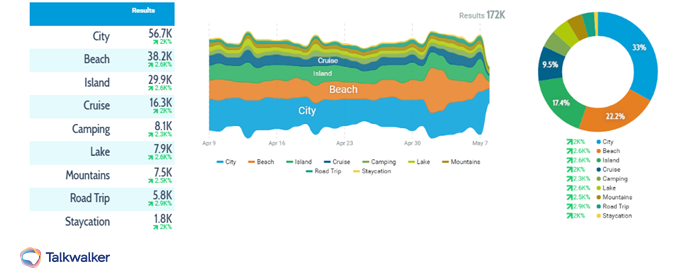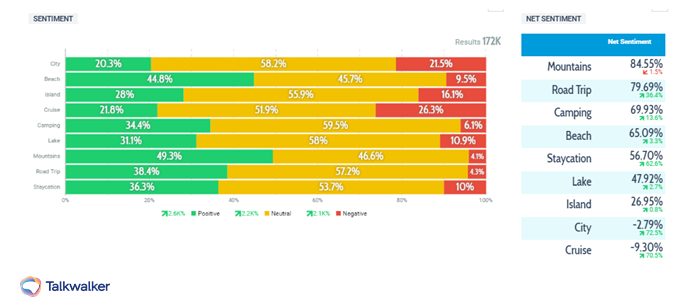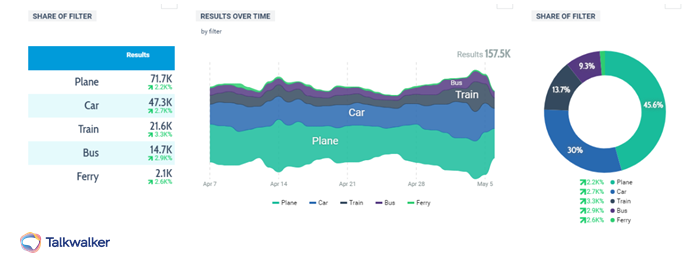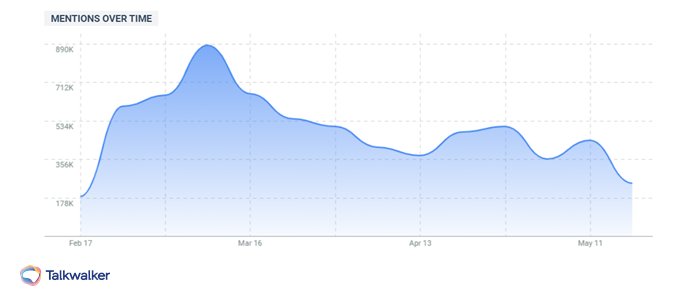DOWNLOAD: Social Media Audience Trends Today
The COVID-19 outbreak has caused unexpected repercussions for most businesses around the world, but one of the hardest hit spaces has been the hospitality industry. From airlines to Airbnb, any brand that touches travel has been impacted by the strict restrictions that have been put in place to limit the spread of coronavirus. After facing months of doing their part to #flattenthecurve, the increasing temperatures and talk around lifting travel bans has people getting optimistic about going on vacation again.
But not everyone is excited to hop back on a plane and rush to a crowded city anytime soon, and there will be new expectations around travel that service providers will have to meet to retain their customers going forward.
Who is ready to go to Vegas? Not me!
Who is ready to eat at a restaurant? Not me!
Who is ready to go on a cruise? Not me!
Who is ready to get on a plane? Not me!
Who wants tocgo to the Mall? Not me!
Who is going hang out by their own pool for the summer? ME ME ME!— Juli (@JuliIndica) May 6, 2020
This Twitter user expresses some of the concerns that are on people's minds as they think about traveling during the COVID-19 pandemic.
I spoke with Kim Grijalva and Helen McCabe Young of Stella + McCabe, an integrated design and marketing firm specialising in the travel and hospitality industry, about the common themes they’ve seen in industry conversations this year. They shared that hospitality brands are largely asking questions around what will make people feel ready to travel again, like:
- What is first on bucket lists for travel as the country reawakens?
- What types of vacations are people looking for, and what will they avoid?
- How are consumers reacting to messaging regarding hospitality cleanliness and travel safety?
- News fatigue is starting to hit hard and people may be limiting what they view just as the travel industry starts to reopen - how can a travel or hotel brand stand out and not sound like more noise?
I explored three major themes in online conversations around travel - destinations, transportation, and accommodation - to find the answers to these questions. By investigating how people are talking about traveling online - from their dream getaways to what would make them to feel safe enough to book them - we can track trends and see how consumer behavior will be impacted by this year’s “unprecedented” events.
1. Destinations
As countries around the globe create plans to reopen their economies and borders, people are talking more about the trips that they are planning when the time finally comes to take them. “Vacation” is definitely on the brain, and examining conversational trends around travel themes gives some insight into the places people want to go once they can get out of the house:
This emoji theme cloud for “vacation” shows that people are excited for the day they can book a flight for a tropical getaway or international escape.
When comparing the types of trips people are talking about taking online - i.e., heading to a different city, or taking a beach vacation - there are some destinations that are more top-of-mind than others. Online mentions show that people are taking social distancing considerations into account when planning where to go, and vacations that are more outdoor-focused have been discussed more heavily in recent weeks.
Road trips, mountain hiking, and “staycations” are populating conversations as people figure out ways to take time off while still self-isolating. People are planning to take trips where they can give others space, like traveling to beaches and islands or going camping.
Mentions around the types of vacations that people plan to go on have fluctuated over the last month as travel restrictions nationwide have been reassessed.
Sentiment analysis reveals further insights about the types of trips people will be taking. It’s not surprising that cruise trips aren’t making up much of the conversation right now, since it’s difficult to socially distance aboard a ship. A negative net sentiment around “cruises” correlates with the lack of conversation.
But although “cities” still heavily factor into the conversation around travel, people are speaking more about leaving them than going to them. City vacations have low sentiment for the same reason that cruises do - lack of social distancing - and many of the travel-related conversations happening about “cities” online are from people talking about escaping them to go to more rural, open areas.
Vacations that allow people to socially distance themselves, like Mountains and Road Trips, are seeing more positive mentions online.
Metropolitan areas have been the hardest hit by the COVID-19 outbreak, and it may be some time before people are comfortable traveling to them. This is a reality that many cities that rely on tourism will be facing as they head into the typically busier summer months.
FREE REPORT: Social Media Audience Trends During the Pandemic
2. Transportation
Despite the new concerns that factor into planning any kind of trip this year, overall online sentiment shows that people still are generally positive about being able to travel again. They are willing to go on trips and plan vacations as long as they can do so safely.
But how will they get to the places they’re traveling to, and what kind of precautions will they take during their trip? In looking at the top forms of transportation, it appears that “planes” and “cars” are the main modes that people are discussing:
Planes make up nearly half of the conversation about travel transportation online.
However - much like with the conversational data around destinations - further analysis shows that people are not comfortable with air travel at the moment:
When deciding how to get from place to place, planes have had the lowest positive sentiment and the highest negative sentiment in recent weeks.
While planes are certainly a popular topic in the online conversation around travel, it’s because people are apprehensive about being on them. Close quarters within airplane cabins and a lack of control over who one is traveling with are major concerns that are making people steer toward other forms of transportation now. Everyone seems to deem their own car as the safest way to get from place to place.
Brands in the transportation industry need to assure customers that they can feel safe using their services if they want to improve their online sentiment. Being transparent about steps that are being taken to follow health protocols and protect travelers is essential for companies that want to maintain a good public standing at this time.
For example, Southwest Airlines is using social media as a platform for their leaders to engage with customers and share the steps that they are taking to guarantee their safety while they travel:
Our CEO Gary shares his thoughts on the Southwest Promise to keep our Employees and Customers healthy. #SouthwestHeartStrong https://t.co/cTwfE0ezC6
— Southwest Airlines (@SouthwestAir) May 15, 2020
By addressing audience concerns and providing information, brands in the travel industry can build trust with customers now so that they are seen as reliable partners in the future.
3. Accommodation
While camping alone deep in the woods may turn out to be the vacation trend of 2020, there are still many discussions happening online around hotel and resort stays. There had been a steady decline in mentions for hotel visits since stay-at-home orders were implemented in March, but murmurs of regional reopenings have begun to kick start conversations about accommodation for the trips people have now been dreaming of for months:
Mentions for “hotels” have started to increase again as travel is re-entering the realm of possibility.
Much like with their transportation options, people want to be sure that any place they decide to stay can guarantee the safety of their facilities. In looking at themes in the key sentiment drivers around “hotels” in conversation, I saw that perceived cleanliness directly correlated with positive or negative engagement with audience members:
Negative sentiment drivers for hotels express travelers’ issues with health and safety, while the word “clean” is driving the most positive sentiment in online discussion.
Brands in the accommodation space will need to provide clear messaging to customers about the steps they are taking to make sure that their facilities are fully disinfected. Anyone planning to stay at a hotel or resort while they are traveling will be looking for reassurance that they’ll be safe in doing so.
In the meantime, hotel and resort brands are continuing to try to connect with consumers through social channels and public initiatives. Some brands are using social media to keep in touch with customers, or even explore ways to engage with new audiences. Kimpton Hotels is using their platforms to share content that you wouldn’t expect from a hospitality brand (like photo editing tips and book reviews) but the pivot can help them maintain relevance and stay active in online conversations.
For the ultimate #ThrowbackThursday, we’re revisiting a nineties standby. This week’s *Virtual Social Hour* features none other than... the Cosmo. We’ll be showing you how to serve up this classic pink drink. For a good time in a glass, tune in on Instagram tonight! pic.twitter.com/PQpCvUWmEe
— Kimpton (@Kimpton) May 14, 2020
Kimpton’s “Virtual Social Hour” offers educational content to followers while tapping into a potential new digital audience of craft cocktail enthusiasts.
Other hospitality companies are using charitable relief as a way to give back to consumers during this time. These initiatives have often brought together brands that would typically be competing for the same share of voice. Several hospitality brands have partnered for the #BuyOneGiveOneStay program, in which people can purchase a room booking for a future date and in return participating hotels will give a free stay to a healthcare worker as a “thank you” for their business. Others have teamed up to donate millions of their empty hotel rooms to medical workers across the country. By joining together and stepping up to support their communities, these brands can gain positive traction with consumers while their business scope is limited for now.
There is no denying that many people are looking forward to the day that they can hop on a plane and jet out of town for awhile, but there are a lot of steps travel brands need to take to make them comfortable enough to take that leap. Guaranteeing the safety and health of customers will have to be the priority for any companies in the transportation or hospitality space to be successful once travel restrictions are lifted. Those that watch the trends and pay attention to what their audience is talking about will be able to meet their needs and expectations much more quickly.

